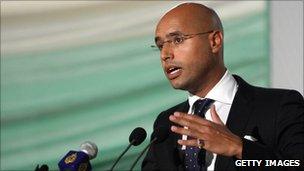How Libya's Saif al-Islam Gaddafi seduced the West
- Published

Saif al-Islam Gaddafi's credibility as the 'acceptable' face of the Libyan regime has been damaged
The director of the London School of Economics Sir Howard Davies has submitted his resignation after admitting an "error of judgment" in establishing links with the regime of Libyan leader Colonel Gaddafi.
Sir Howard visited Libya to advise the regime about financial reforms and accepted a £300,000 donation from the Libyan leader's second son Saif al-Islam Gaddafi for research at the LSE.
His departure underlines just how politically toxic links with the Gaddafi regime have become ever since it began its brutal suppression of the Libyan uprising.
Saif al-Islam's former friends and business associates in the west have become embarrassed to admit ever knowing him now his reputation as a liberal reformer has been scuttled.
Yet just a few weeks ago Saif was socialising with the creme de la creme of British society.
So how did so many respectable people get it so wrong?
In part this is because Saif makes such a good impression in the media. Tall and handsome, he speaks fluent English and presented himself as the acceptable face of the Gaddafi regime.
With few exceptions, he sided with the reformers in Libya and seemed prepared to go head-to-head with his father in an attempt to develop the fledgling Libyan private sector and open up the atrophied media.
'Like the Godfather'
But Saif's warm reception in influential business, academic and political circles in the West was also attributable to the eagerness in some quarters to gain access to Libya's oil wealth.
"If Libya was a country without an oil producing capacity, I don't think Saif would have convinced the West," said Dr Omar Ashur, a lecturer in the Institute of Arab and Islamic Studies at the University of Exeter.
"Because of the interests [the West had in Libya] the moral dimension was pushed aside for a while or frozen for a while. But after what happened in Libya in the last few days I don't think this can continue anymore."
Like the rest of Gaddafi's children, Saif lived a life of privilege and ease, although like his father he claimed to have no official position and denied having access large funds.
But now new evidence has emerged that despite his denials, Saif in fact controlled the multi-billion-pound Libyan sovereign wealth fund, the Libyan Investment Authority (LIA).
"I've seen the Godfather. This is the closest thing in real life," commented a Libyan investment banker familiar with how the LIA was run.
"It is as if it is his own private farm. This was almost like a mafia operation."
'Mother of all funds'
The ostensible purpose of the Libyan Investment Authority - known in Arabic as "the mother of all funds" - was to manage Libya's excess oil wealth for the benefit of future generations.
Saif al-Islam, Colonel Gaddafi's son, appears on Libyan TV and accuses people outside Libya of provoking violence
Its assets were valued at around £50bn to £60bn ($80-100bn) and included shares in Juventus football club, Italian oil giant Eni, and Pearson, the owner of the Financial Times.
Saif appointed an old college friend named Mustafa Zarti to manage the LIA on his behalf.
"Zarti wasn't made deputy chairman of the LIA because of his talent in investment. It was out of his loyalty and proximity to Saif. Saif put him there to ensure he implements whatever investment policy was required of him," said the banker.
The way the LIA worked was that Saif would cut opaque business deals with his super-wealthy friends at private parties, sometimes using middle men, and then Zarti would be instructed to push them through.
"It was very much top down. Saif would give the deals to Mustafa. Mustafa would give them to his team.
"Obviously he never would be held accountable because he never signed anything and to best of my knowledge Mustafa didn't sign anything," the banker said.
Bad deals
Many of the deals Saif and Mustafa tried to push through made little financial sense and were met with strong objections by the staff at the LIA.
Some of these bad deals fell through, including ones with Bernie Madoff and Saif's close friend Nat Rothschild, but other bad deals were done and ended up costing the LIA millions.
"The LIA was being pushed by Saif and Mustafa to invest in Rusal, a Russian aluminium company which had a lot of issues," said the banker.
"The deal was fought tooth and nail by the investment committee, by the board, but in the end it was done. You could say no some of the time to Saif's deals but you can't say no all of the time."
Financial corruption by the Gaddafi family and others linked to the regime has been one of the key drivers of the current Libyan uprising.
The LIA's funds have now been frozen under UN sanctions and on Tuesday the Austrian foreign ministry asked Austria's Central Bank to look into freezing Mustafa Zarti's Austrian assets.
His future, like the future of Saif himself, remains uncertain.
"The right place for many of the leading figures in this regime is the International Criminal Court. To prolong the life of the regime there was a very successful strategy to provide another face and that face was of Saif al-Islam, the LSE graduate, a reformist leading development," said Omar Ashur.
"They were people who were trying to disguise themselves as doves, but in the end they were brutally repressive figures. I don't think there are doves within the Gaddafi regime - including Saif al-Islam."
Hugh Miles is an award winning writer and broadcaster, the author of Al Jazeera - How Arab TV News Challenged the World.
You can listen to this special edition of The Report on Libya via the BBC iPlayer now or download the podcast. It will be re-broadcast on BBC Radio 4 on Sunday 6 March at 2100 GMT.